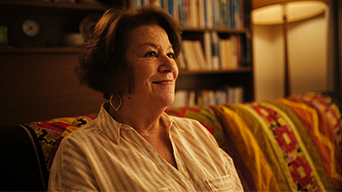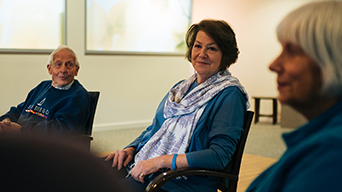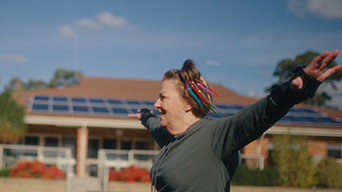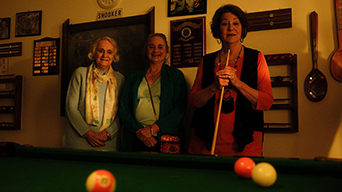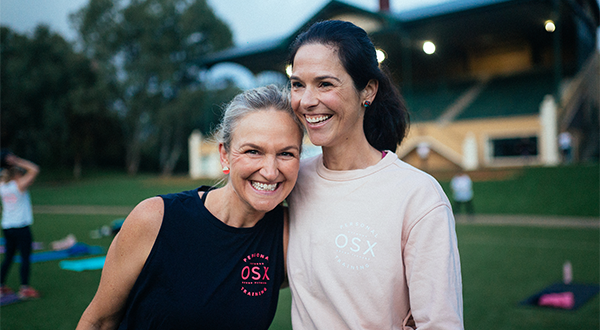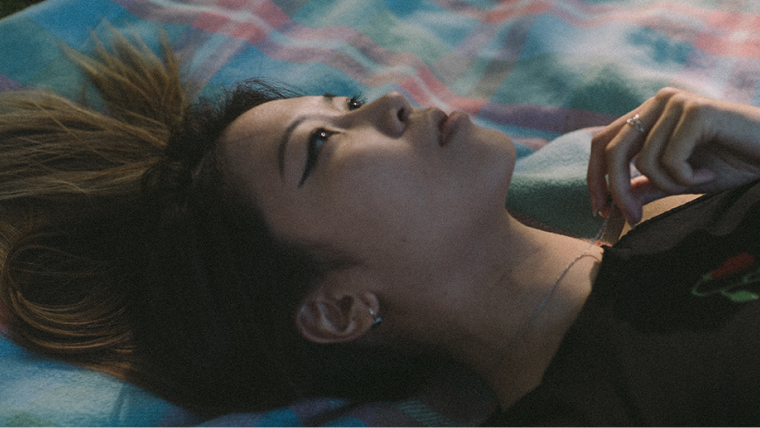Even though she lives in a retirement village, Sandi Givens hasn’t exactly settled down. She still works, running her own business, and lights up any room she enters.
As she sits at her kitchen table, Sandi stares down at a scrapbook. Each page is layered with photos of family and friends, memories from her life. Her son Jesse is the centrepiece of many of the photos.
Sandi talks of always wanting to be a mother. Even as a child, she would dream about her future family. Sure, she had other ambitions, but becoming a mum was at the top of the list.
Once she became a mother, Sandi realised being a parent wasn’t what she thought it would be. As she came to grips with this, she was consumed by post-natal depression.
Starting a family
Married by her mid-30s, Sandi and her then-husband started trying for a baby. Three and a half years later, they were still trying. The doctors described it as ‘unexplained infertility’ - there didn’t seem to be a reason it wasn’t working. Sandi just couldn’t get pregnant.
They decided to go down the path of IVF. Two months later, Sandi became pregnant naturally. She was thrilled.
“I just felt so blessed and excited that my life-long dream was finally coming true!”
Sandi’s pregnancy was relatively smooth, but just two weeks after Jesse was born, he underwent surgery. It wasn’t life-threatening but he never breastfed well from that point. This impacted both of them, and felt significant to Sandi.
Struggling to connect
Having just moved from inner-city Melbourne to the Yarra Valley, Sandi didn’t know many people locally. Her mother came over from interstate to help out, but she was sick herself, so Sandi found herself looking after both Jesse and her own mum.
Sandi’s mother recovered and went home around the same time as Jesse’s dad went back to work. With only her and Jesse in the house, the days started to stretch.
Sandi became restless. She would often take Jesse to the grocery store and wander aimlessly down the aisles. Then suddenly Sandi would become panicked and rush home, leaving a full trolley behind.
“There were days I would do this three or four times. Being out of the house would make me feel confused and my heart would race,” she says.
“Yet then I would get home and after a little while, I felt claustrophobic – as if the walls were closing in on me. The silence was almost deafening.”
Sandi didn’t share this with anyone at the time. She was embarrassed, unable to understand how other new mums were coping when Sandi couldn’t.
“I truly believed I loved Jesse, but I’m still kind of ashamed to say I didn’t like him very much. I didn’t feel I could connect with him the way I saw his dad and other people doing,” she says.
Jesse’s first Christmas came when he was five months old. Surrounded by family doting over her son, feelings of claustrophobia and isolation overwhelmed her.
Excusing herself, she went outside, sat in the driveway and cried.
Seeking help from a GP
Sandi agreed to see a doctor shortly after and was diagnosed with post-natal depression. It didn’t help – both Sandi and Jesse’s dad were disbelieving of the diagnosis.
“We decided this doctor didn’t know me from a bar of soap and had it all wrong. We figured all we needed was a week at the beach as a family so I could get some rest.”
Sandi recalls a time when she was home with Jesse and speaking with her sister Kim on the phone. Kim asked how Jesse was doing and Sandi said she didn’t know where he was. After Kim insisted she go look for him, Sandi did. She found him, but couldn’t remember how long she was gone for.
“When I eventually came back to the kitchen, I saw the phone was off the hook. I picked it up and asked if anyone was there. I can’t imagine how this must have frightened her,” says Sandi.
That night, Kim came over to Sandi’s house and told her she was concerned for Jesse’s welfare. Kim had organised Sandi and Jesse to be admitted to a mother-child unit at a psychiatric hospital.
Sandi didn’t argue – by this stage, she was ready to agree to anything.
A unique first Mother's Day
The initial plan was to stay a few weeks at the hospital but Sandi and Jesse wound up being there for four months.
It was hard. Sandi didn’t seem to be getting better. At times, it felt like things were getting worse.
“I was not motivated to do anything. I was quite happy to sit and stare out the window, not eating or drinking anything, and just pray that somehow as the hours passed, something in me would change,” she says.
Sandi spent her first Mother’s Day inside the unit.
“I’d wanted this child my whole life and now I had this perfect, healthy, delightful child and I saw him more as a chore than someone to be loved and nurtured,” says Sandi.
“I was worried I was damaging Jesse – that seeing his mother cry so much and be so unhappy and lifeless would literally scar him for life.”
Connecting with a psychiatrist
Slowly, Sandi started to mend, thanks to a combination of her support network and a psychiatrist that she really connected with.
“We just clicked, and although some of the therapy sessions really challenged me, I knew I was improving,” says Sandi.
Just before Jesse’s first birthday, Sandi was discharged. She was both scared and ecstatic.
One condition of Sandi’s release was that on days she was home by herself with Jesse, childcare assistance – in the form of a family day-care mother – would support her for at least four hours. Initially, it was a bitter pill to swallow.
“At first, I felt guilty about having all that help. But with ongoing sessions with my psychiatrist, I came to accept that it wasn’t selfish,” says Sandi.
“This was simply the way I could continue my recovery and become the best mother, wife and businesswomen I could be.”
Finding ways to cope and grow
Sandi’s recovery was slow but steady. Even when she felt capable of caring for Jesse on her own, Sandi continued to lean on the day-care mother, Larraine, a couple of days a week. They had formed such a strong connection – Sandi still calls her on Mother’s Day.
Sandi also picked up some strategies to support her own mental health, from swimming and rollerblading to listening to classical music and aromatherapy.
Her relationship with Jesse improved dramatically. These days she can’t stop talking about him – his achievements, his ambition, who he is a person.
Looking down at her scrapbook, with a smile on her face, it’s clear that being a mother has lived up to Sandi’s expectations.


